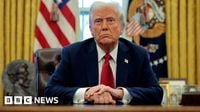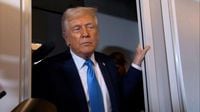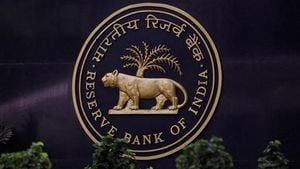On March 30, 2025, in a striking shift in tone, U.S. President Donald Trump expressed his deep frustration with Russian President Vladimir Putin during an interview with NBC News. Trump stated he was "very angry" and "pissed off" over Putin's recent comments undermining Ukrainian President Volodymyr Zelensky's leadership. This marked a significant departure from Trump's previous conciliatory stance toward Russia, as he threatened to impose substantial tariffs on Russian oil if a ceasefire in Ukraine could not be negotiated.
During the 10-minute phone interview, Trump made it clear that he would hold Russia accountable for the ongoing conflict in Ukraine. "If Russia and I are unable to make a deal on stopping the bloodshed in Ukraine, and if I think it was Russia's fault - which it might not be... I am going to put secondary tariffs... on all oil coming out of Russia," he declared. This threat of tariffs, which could reach as high as 50% on goods from countries purchasing Russian oil, signals a new level of pressure from the U.S. on Moscow.
Trump's frustration was particularly directed at Putin's remarks questioning Zelensky's credibility, which Trump himself had also criticized in the past. "You could say that I was very angry, pissed off, when... Putin started getting into Zelensky's credibility, because that's not going in the right location," Trump remarked. He further noted that the Kremlin was aware of his anger but maintained he had a "very good relationship" with Putin, suggesting that such feelings could dissipate if the Russian leader acted accordingly.
In the backdrop of these tensions, Ukrainian President Zelensky responded to Trump's comments, emphasizing that Russia has consistently sought excuses to prolong the conflict. He referred to Putin's behavior as a continuation of the same tactics employed since 2014, when Russia annexed Crimea. Zelensky pointed out that the U.S. proposal for an unconditional ceasefire had been on the table without a proper response from Russia, which he said was critical for peace.
The conflict in Ukraine, which began with Russia's full-scale invasion in February 2022, has seen significant casualties on both sides. According to data analyzed by BBC Russian and other independent sources, over 100,000 Russian military personnel have died, while Ukraine's last reported figures in December 2024 indicated around 43,000 Ukrainian military deaths. Western analysts suggest that Ukraine's casualty figures may be underreported.
Trump's comments also included a broader context of his foreign policy approach. Besides his anger toward Putin, he hinted at potential military action against Iran if the country continued its nuclear weapons program. "If they don't make a deal, there will be bombing," Trump stated, reinforcing his administration's hardline stance on Iran, which has been a focal point of U.S. foreign policy since Trump withdrew from the nuclear agreement in 2018.
In light of these developments, Trump confirmed he would be speaking to Putin later in the week, indicating a desire to continue negotiations despite the heightened tensions. He also teased the possibility of seeking a third presidential term, stating, "A lot of people want me to do it," while asserting that it was still early to consider such a move.
As the situation unfolds, the international community watches closely. Trump's threats of tariffs and military action could reshape the dynamics of the ongoing conflicts in Ukraine and Iran, as well as the U.S.'s relationship with Russia and its allies. The implications of these statements will likely resonate across diplomatic circles, as leaders grapple with the consequences of Trump's assertive rhetoric.
In summary, Trump's recent comments reflect a significant escalation in rhetoric against Russia and a commitment to holding Putin accountable for the ongoing violence in Ukraine. As the world awaits the outcomes of these negotiations and potential military actions, the stakes have never been higher for global peace and stability.





